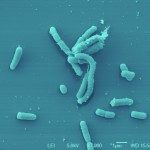Link to Pubmed [PMID] – 17768254
Link to DOI – 10.1099/mic.0.2007/006213-0
Microbiology (Reading, Engl.) 2007 Sep; 153(Pt 9): 3112-3124
Yersinia pestis is the aetiologic agent of plague. Without appropriate treatment, the pathogen rapidly causes septicaemia, the terminal and fatal phase of the disease. In order to identify bacterial genes which are essential during septicaemic plague in humans, we performed a transcriptome analysis on the fully virulent Y. pestis CO92 strain grown in either decomplemented human plasma or Luria-Bertani medium, incubated at either 28 or 37 degrees C and harvested at either the mid-exponential or the stationary growth phase. Y. pestis genes involved in 12 iron-acquisition systems and one iron-storage system (bfr, bfd) were specifically induced in human plasma. Of these, the ybt and tonB genes (encoding the yersiniabactin siderophore virulence factor and the siderophore transporter, respectively) were induced at 37 degrees C, i.e. under conditions mimicking the mammalian environment. Growth in human plasma also upregulated genes involved in the synthesis of five fimbrial-like structures (including the Psa virulence factor), and in purine/pyrimidine metabolism (the nrd genes). Genes known to play a role in the virulence of several bacterial pathogens (such as those encoding the Lpp lipoprotein and non-iron metal-uptake proteins) were induced in human plasma, during either the exponential or the stationary phase. Finally, 120 genes encoding proteins of unknown function were upregulated in human plasma. Eleven of these genes were specifically transcribed at 37 degrees C and may thus represent new virulence factors that are important during the septicaemic phase of human plague.





